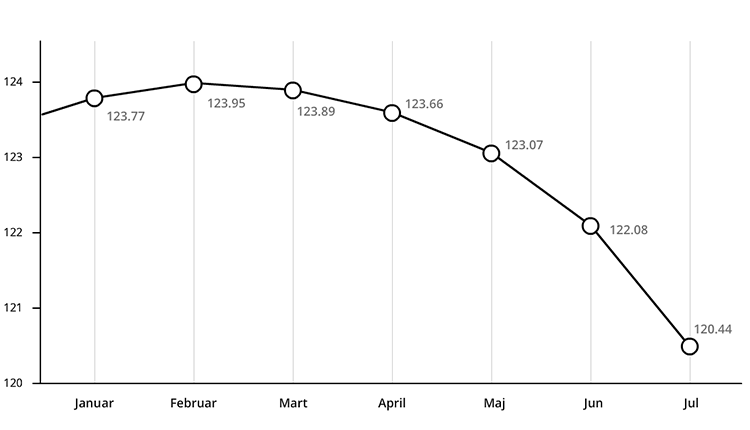Observing the movement of the average exchange rate of the Euro during 2017, many have rightly wondered - what is going on with this currency?
The Euro has been in constant decline since April, i.e., the domestic currency is constantly getting stronger compared to foreign currencies. The dinar is 3.5% stronger against the Euro than a year ago, 1.1% stronger than a month ago, and 3.6% stronger than at the beginning of this year.

The strength of a currency is usually influenced by 3 basic parameters:
Home economy strength in international relations
The Ministry of Finance and the National Bank of Serbia, as well as relevant international financial institutions, expect that the real GDP growth of Serbia in 2017 will amount to 3.2-3.6%, and that this trend will even accelerate in the forthcoming two years. Exports, expressed in euros, grew at the rate of 13.6%, slightly more than imports, which grew by 12.9%. The consolidated budget deficit in 2017 will fall to just 1.1% % of GDP (SOURCE Chamber of Commerce and Industry of Serbia). The EU estimates that its economy will grow by only 1.8-1.9% in 2017.
This demonstrates that the economic indicators are slightly improving, which affects the strengthening of confidence in the domestic currency.
Inflation rate
The inflation rate in Serbia of around 3% at an annual level is expected, which is not much higher than the one expected in the euro zone - 1.5-1.6%. The low price of oil shall also affect the low rate of inflationary expectations.
Supply and demand on the foreign currency exchange market
- The net inflow of foreign direct investments in 2017 will amount to about 1.7 billion US dollars, which can be called satisfactory.
- During the summer months, domestic guest workers come en masse to the homeland, bringing along large amounts of foreign currency, by the means of which supply of foreign currency is increased, decreasing its "price", i.e., exchange rate against dinar.
- The National Bank of Serbia is even forced to intervene by buying euros on the interbank foreign exchange market to mitigate excessive daily exchange rate fluctuations.
Winners and losers
The growth of the dinar will make some people happy, and some people not. It will be easier for users of euro-indexed loans (from individuals, through companies, to the state) whose installments calculated in RSD will decrease, as well as for recipients of wages that are not indexed in foreign currency. Importers are also winners, as they will be able to buy the foreign currency needed for import cheaper.
The losers are exporters (which is not good), since they will receive much less dinars from the National Bank of Serbia for the euros they earned than they expected, employees whose salaries are indexed in euros and guest workers who may think that the strengthening of the domestic currency was artificially induced in order to cheaply buy foreign currency from them.
As the saying goes, “One man's loss”…


